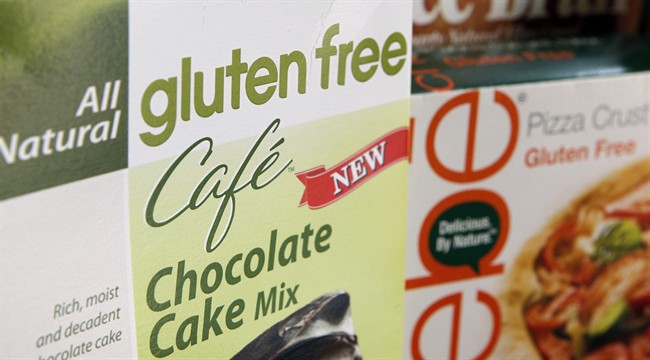TORONTO – Canadians may be losing their taste for gluten-free foods.

After nearly five years of consistent growth and a tripling of sales since 2009, the gluten-free food category declined last year, according to research firm NPD Group.
The Canadian Celiac Association estimates that one in 133 Canadians is affected by celiac disease and suffers after consuming gluten, a protein found in wheat, barley and rye that gives bread elasticity.
But many other Canadians have bought into suggestions that a gluten-free lifestyle can offer anyone health benefits, including weight loss.
The market responded with a glut of specialty products in supermarkets, but consumers may be tiring of the extra effort and cost that’s required to go gluten-free, says Robert Carter, executive director of food service at NPD Group.
“When we look at the trends that drive consumer behaviour it always comes down to convenience,” says Carter, who noted females and younger consumers under 35 tended to be big buyers of gluten-free foods.
“As people started to understand the amount of work it requires to actually be truly gluten-free, I think the benefit started to wane a little bit.”

Get weekly health news
For those with celiac disease, a wheat allergy or what some people call non-celiac gluten sensitivity, gluten-free products have been a much-welcomed godsend. Those people cannot choose to eat wheat and must seek alternatives, says Cara Rosenbloom, a registered dietitian in Toronto.
READ MORE: Canadian researchers developing treatment for celiac disease
“For those people, gluten-free is not a joke. It’s a true diet that they will require for life, and for those people they benefit from the influx of all these gluten-free products,” says Rosenbloom.
“However, what happened on the other side is that other people didn’t understand that gluten-free was a clinical diet. They thought it was a weight-loss diet and they started buying gluten-free, the same way we bought fat-free or sugar-free. They figured if it was ‘free’ of something, then it must make it healthy.”
There have been contentions of “amazing benefits” associated with gluten-free diets.
READ MORE: Gluten-free tops Canada’s hottest food trends for 2014
Most famously, cardiologist William Davis touted in his bestseller “Wheat Belly” that autoimmune, gastrointestinal and mental issues could be improved or reversed by going gluten-free. He blamed “genetically altered Frankenwheat imposed on the public by agricultural geneticists and agribusiness” for many health woes.
But some researchers who study the science behind gluten and the genetic components of wheat are debunking those claims.
READ MORE: Gluten-free for weight loss? You’re doing more harm than good: study
Ravindra Chibbar, a professor in the department of plant sciences at the University of Saskatchewan, and his team have found little difference in wheat protein concentrations and quality in grain grown over the past 85 years.
And Julie Miller Jones of St. Catherine University in St. Paul, Minn., has published a paper suggesting many of Davis’s claims are anecdotal, not based on research.
Rosenbloom says there’s not one food that consumers can point to as the root cause of obesity or weight gain.
“It’s too much processed food, it’s our lifestyle, it’s inactivity, it’s our foods in general, it’s our environment, it’s what we’re exposed to, it’s socio-economic status. There’s so many factors that play into obesity that saying that gluten is the cause is just not true at all,” she says.





Comments